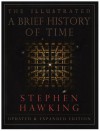A brief history of everything: two by Stephen Hawking
Sometimes when I'm trying to sleep I let my mind wander off and I start to think about space and stars and planets. I like to imagine what it would be like to be a cosmic traveller like the Silver Surfer or something, with the ability to travel to the boundaries of the universe and to the beginning and end of time and beyond, if there is a beyond. Of course, this takes a considerable amount of imagination and I can't help but eventually come to an impasse when I reach the outer limits of human comprehension. This usually occurs about three or four in the morning. After realizing that the greater mysteries of the universe have kept me up for the better part of the night and I need some sleep, I then usually start thinking about simple stuff, like cars, pizza, girls or something.
Someone else who has thought a lot about this kind of stuff (you may have heard of him) is a guy named Stephen Hawking. And of course you've heard of him. Hawking is one of the greatest minds of this era and I looked to a couple of his books to help me along my cosmological journey: The Theory of Everything: the origin and fate of the universe and The Illustrated Brief History of Time.
As illuminating as these two books are, I have to point out that they are practically the same book. Both highlight Hawking's main arguments and conclude with considerations regarding the reconciliation of general relativity with quantum mechanics. When I say these are practically the same book, I do not exaggerate. Entire chapters (like "Black Holes Ain't So Black" and "The Direction of Time") are very near duplicates. I've had to return The Illustrated Brief History of Time to the library so I can't now directly compare the two, but suffice to say that reading both titles is unnecessary. I would probably recommend The Illustrated Brief History of Time first since it benefits from being illustrated and expands upon the first edition. The Theory of Everything is introduced as a series of lectures by Hawking. If so, I surmise that they are canned lectures taken from A Brief History of Time, so there's no point in reading both. The books are so similar, even down to the exact same jokes and anecdotes, that I wonder why they were published under separate titles.
Anyway, the ideas presented therein are nothing short of fascinating and presented in perhaps the easiest possible of ways for the layman. Even so, some of the concepts are a little dense for non-scientists and take a bit of careful reading to get through. Fortunately, Hawking is a good writer and makes it a point to present these concepts in an as accessible manner as possible.
Hawking first covers the general historical concepts of the nature of the universe and how they have developed through the times, settling on the "Big Bang" theory of origin. He writes about the importance of black holes and how important they are in relation to gravity, light and space-time. He covers notions on the eventual fate of the universe, the progression of time and concludes with thoughts on the unification of physics, reconciling general relativity with quantum theory, creating a "theory of everything."
It's all pretty deep stuff. But besides the science aspect, The Theory of Everything and A Brief History of Time are amazing reflections on how humans envision existence and the universe, stretching our viewpoints beyond traditional concepts of reality, boundaries and linear time. It really is extraordinary and while the stuff is mostly theoretical it does serve, for me anyway, as a more acceptable model for the basis of the universe than any arbitrary, tradition-based cosmology (ie, religion) could. That is not to say that the idea of god is left out of Hawking's worldview, but it is reserved for the things we can't explain with science; the rest are matters of fact and logic.
My verdict: ★★★★✬ (4.5/5 stars) for both, since both books have practically the same content. The Illustrated Brief History of Time is nice to start with because of the helpful illustrations and diagrams, but The Theory of Everything is more compact and, in some ways, flows better than the former, since not all of the illustrations in The Illustrated Brief History of Time are that useful. Just from a personal standpoint, neither book receives a full 5★ from me simply because they are too similar (I advocate recycling, but cans and newspapers and stuff--not books you've already written). Either way, both books are wins and are profoundly fascinating.






 1
1
 3
3